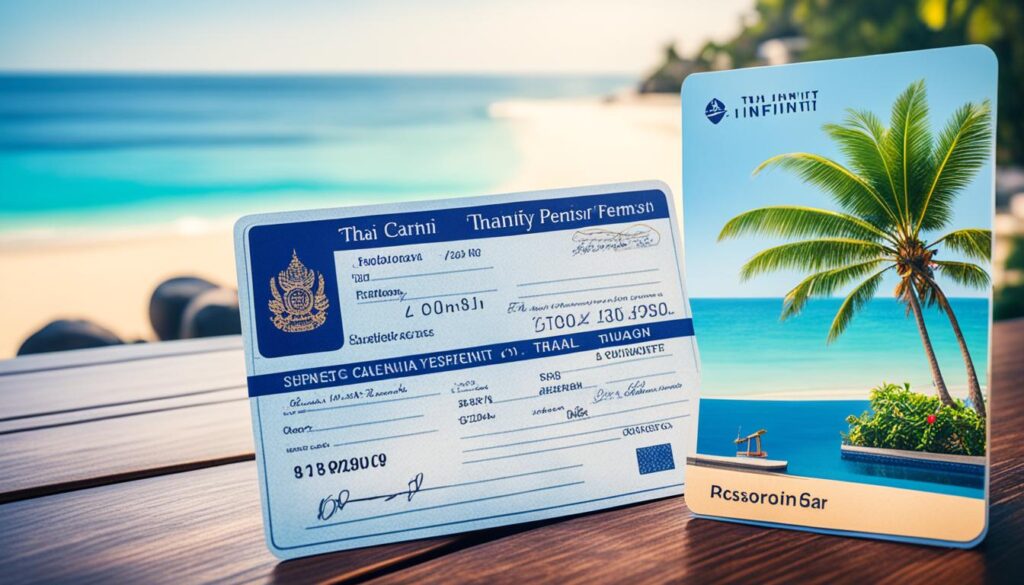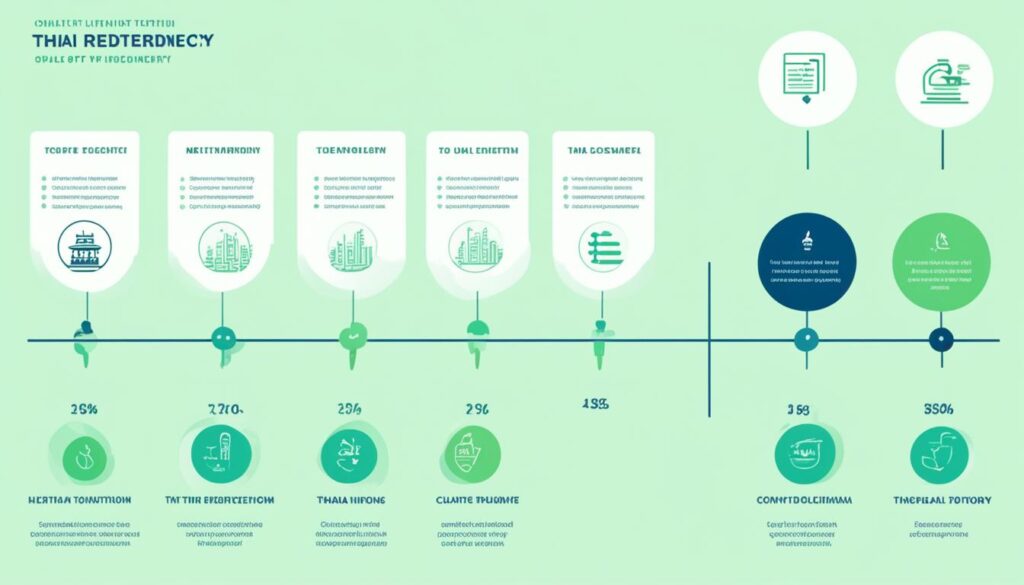Are you considering a move to Thailand? This guide aims to provide a comprehensive overview of the Thailand Residence Permit process, focusing on how to apply, the eligibility criteria, and the benefits associated with permanent residency. With its reasonable cost of living, vibrant culture, and favorable lifestyle, Thailand has become an attractive option for many expats looking for a long-term stay in Southeast Asia. Understanding the Thailand visa requirements can make the journey to permanent residency much smoother. Notably, information suggests that becoming a permanent resident may lead to further opportunities, including the possibility of Thai citizenship after holding residency for a decade1.
Key Takeaways
- Thailand offers various visa options for long-term residency.
- The Thailand Residence Permit allows for permanent residency after meeting specific criteria.
- Annual reporting is essential for maintaining permanent residency status.
- Thailand immigration rules include restrictions on land ownership for foreign nationals.
- Various visa programs cater to different eligibility scenarios, including the Thailand Elite Visa.
Contact us if you are Interested in Buying Property Abroad!
Understanding the Thailand Residence Permit
The Thailand Residence Permit, particularly the Permanent Residency (PR), allows foreigners to establish their lives in the kingdom indefinitely. Valid for up to ten years, the PR is divided into an initial 5-year term, which can be extended for an additional 5 years, provided the applicant meets the requirements for Thai residency. Understanding the application process will help you navigate Thai immigration more smoothly Only 100 permits are issued per nationality each year, making timely applications essential.
Once granted, the PR status offers significant benefits, including the freedom to reside in Thailand without the ongoing burden of visa renewals. Individuals can also enjoy increased travel flexibility and opportunities to work legally within the country, which can include roles in both private and public sectors.
In terms of financial implications, the personal income tax for highly-skilled professionals under the LTR Visa program is set at 17%, and applicants may be exempted from the typical employment requirement ratio of four Thais to one foreign worker. Furthermore, income earned overseas that is not brought into Thailand could be tax-exempt, presenting an attractive proposition for many potential residents23.
In response to the country’s aim to increase its foreign talent pool, the Thai government is actively encouraging applications from wealthy individuals and skilled professionals. With a structured yet achievable process, obtaining a Thailand Residence Permit could be a fruitful step for those looking to integrate into Thai society.
Benefits of Obtaining a Thailand Residence Permit

Holding a Thailand Residence Permit comes with numerous advantages, primarily through the concept of Permanent Residency. This designation allows individuals to reside in Thailand without restrictions on duration, making it more appealing for long-term commitment. The process of securing a Thailand residence permit can be quite beneficial, as it opens doors to several opportunities in both personal and professional realms.
Permanent Residency Advantages
Permanent residency in Thailand provides the liberty to purchase property without needing to transfer funds from abroad, which is a significant advantage compared to other visa categories. Permanent residents enjoy accelerated access to work permits, creating a smoother path for career advancement and engagement in the local economy. This status eliminates the need for annual visa renewals or visa runs, allowing individuals to remain in the country indefinitely4.
The ability to apply for long-term visas for immediate family members enhances the family aspect of Thailand expat residency. With favorable provisions like these, many applicants find the process rewarding both for themselves and their families. Residents earn the chance to pursue Thai citizenship for their children, further integrating them into Thai society4.
Ease of Business Opportunities
Obtaining a Thailand Residence Permit significantly enhances ease of business opportunities. Permanent residents can apply for directorship positions within Thai corporations, a privilege generally not available to holders of other visa types. This involvement in business ventures allows them to navigate the marketplace efficiently, fostering significant connections and opportunities. The regulatory advantages extend to reduced application fees under specific categories, thus promoting investment and employment stability within Thailand5.
Overall, permanent residency opens up multiple avenues for community engagement and economic participation, making it an attractive option for expatriates considering a long-term stay in Thailand. The social integration it encourages not only benefits the applicants but also enriches the local culture through diverse interactions and contributions4.
Contact us if you are Interested in Buying Property Abroad!
Eligibility Requirements for Thai Residency

Understanding the eligibility requirements for Thai residency is crucial for prospective applicants. There are various criteria that individuals must meet to secure a Thailand Residence Permit. These criteria often include holding a non-immigrant visa and demonstrating financial stability.
Non-Immigrant Visa Requirement
An essential component of the requirements for Thai residency is the Non-Immigrant Visa Requirement. Applicants must hold a non-immigrant visa for a minimum of three consecutive years to establish their intent to reside in Thailand. This requirement emphasizes the importance of long-term commitment to living in the country, as it necessitates maintaining the visa status for the duration leading up to the residency application6.
Financial Stability and Employment Criteria
The criteria for financial stability play a significant role in the residency application process. Individuals must provide proof of a stable monthly income and adequate savings to support themselves while living in Thailand. Depending on the specific residency category—be it employment or investment—the exact requirements may vary. For instance, the Wealthy Pensioner category necessitates an annual pension or stable passive income of at least USD 80,000. Those who do not meet the income threshold may invest a minimum of USD 250,000 in Thai property to fulfill eligibility criteria7. The demands for financial stability not only aim to secure the applicant’s self-sufficiency but also ensure that they can adequately support their dependents during their stay in Thailand.
| Category | Income Requirement | Investment Requirement |
|---|---|---|
| Wealthy Pensioner | USD 80,000/year | USD 250,000 in Thai property if income is below threshold |
| Highly Skilled Professional | USD 80,000/year with five years of experience | None specified for application |
| Long-Term Resident | USD 80,000/year for two years prior | Varies by category |
For more detailed information on the eligibility requirements and application process, visit this resource67.
Document Requirements for Thailand Residence Permit
Applying for a Thailand Residence Permit involves gathering a variety of essential documents to support your Thailand visa application process. The primary requirements typically include a completed application form, a valid passport, a personal data form, proof of financial stability, health certificates, and additional documentation relevant to your specific application category. Having these documents ready is crucial, as they significantly enhance your chances of approval during the application review.
Essential Documents Needed
The essential documents can vary greatly depending on which category you choose for your application. For example, if you are applying under the investment category, you will need to provide documents demonstrating an investment of at least 10 million Baht in Thailand, which benefits the country’s economy. Conversely, applicants seeking residency based on employment must show valid employment letters and proof of their annual salary over the past two years, ensuring they meet the financial criteria set forth by Thai immigration.
Specifics Based on Application Category
Understanding the specifics tied to each application category is vital. For instance, applicants applying under the humanity reasons must provide documentation that illustrates their ties to a Thai national. This specificity in document requirements not only aids in streamlining the application but also aligns with the annual quota for Thai Permanent Residency, which permits roughly 100 persons from each nationality8. As you prepare, be mindful of the application timeframe, typically running from October to December, as well as the associated application fee of 7,600 Baht8.
Contact us if you are Interested in Buying Property Abroad!
FAQ
FAQ title
Source Links
- https://www.siam-legal.com/thailand-visa/long-term-residence-ltr-visa-thailand.php
- https://harveylawcorporation.com/thailand-long-term-resident/
- https://ltr.boi.go.th/
- https://thethaiger.com/other-services/permanent-residence/guides/benefits-of-permanent-residence/
- https://www.expatica.com/th/move/immigration/thailand-permanent-residency-2172883/
- https://www.henleyglobal.com/residence-investment/thailand
- https://www.immigration.go.th/wp-content/uploads/2020/01/quota_detail_en-1.pdf
- https://www.siam-legal.com/thailand-visa/permanent-residence-thailand.php

Comments